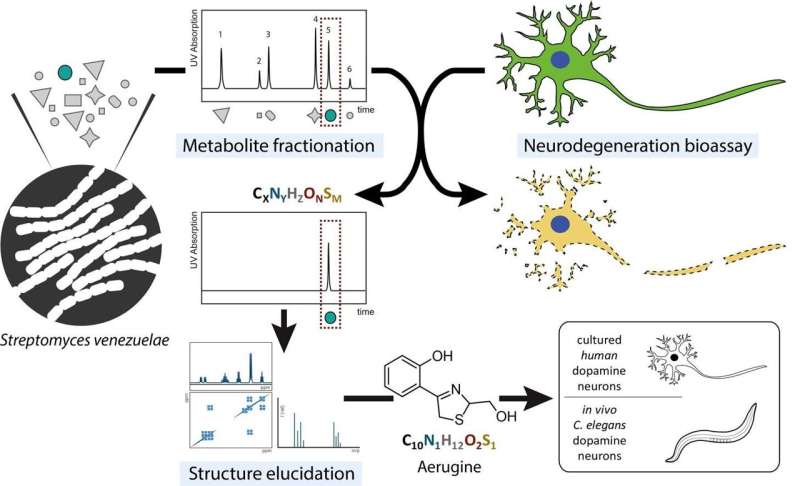This article has been reviewed according to Science X's editorial process and policies. Editors have highlighted the following attributes while ensuring the content's credibility:
fact-checked
peer-reviewed publication
trusted source
proofread
Microbial metabolites as risk factors for Parkinson's disease

A research team has discovered a microbial metabolite that destroys dopamine-producing neurons. Further experiments showed that Parkinson-like symptoms occur as a result.
This research, led by Thomas Böttcher from the Institute of Biological Chemistry and the Center for Microbiology and Environmental Systems Science (CeMESS) at the University of Vienna and Marcel Leist from the University of Konstanz, in collaboration with the Albert Einstein College of Medicine, was recently published in Environment International.
The discovery sheds new light on potential environmental factors—such as metabolites from the human microbiome—as triggers of Parkinson's disease.
The underlying causes of Parkinson's, a serious neurodegenerative disease, remain obscure. While genetic mutations are known to be a cause of Parkinson's, 90% of cases occur sporadically, with no clear genetic origin. Scientists suspect that environmental factors may play a role—substances such as pesticides and industrial chemicals are therefore being examined for possible links to neurodegeneration.
Recent studies highlight the importance of the gut-brain axis and suggest that the human microbiome may influence neurodegenerative diseases. The human microbiome refers to the entirety of all microorganisms that can colonize the human body. The intestinal microbiome of Parkinson's patients differs from that of healthy people. Some microbial metabolites specifically attack dopamine-producing neurons, which are critically affected in Parkinson's disease.
In the current study, the researchers focused on a metabolite produced by the bacterium Streptomyces venezuelae. The team isolated and identified this metabolite and exposed it to human dopamine-producing neurons.
The results were clear: The metabolite had a destructive effect that led to neuronal loss similar to Parkinson's disease. To further validate their findings, the researchers examined the effect of this bacterial metabolite on nematodes, which subsequently showed movement difficulties and specific neuronal patterns similar to those of human Parkinson's patients.
Leist from the University of Konstanz and Böttcher from the University of Vienna worked together on this innovative study that combines the fields of microbial biochemistry and molecular neuroscience. "Our research establishes a tangible link between a specific bacterial metabolite and symptoms similar to Parkinson's. It is a further step in understanding how our environment, down to the microbes around us, influence the onset or progression of such diseases could," says Leist.
This discovery not only offers a new perspective on the triggers of Parkinson's, but also opens new avenues for research. Could other microbial substances influence neurodegenerative diseases? How do these substances interact with our neurons? And most importantly, can this knowledge lead to new treatments or preventative measures?
"Although the study is just a beginning, it is a promising step towards unraveling the molecular causes of Parkinson's and other neurodegenerative diseases," said Thomas Böttcher.
More information: Anna-Katharina Ückert et al, Identification of the bacterial metabolite aerugine as potential trigger of human dopaminergic neurodegeneration, Environment International (2023). DOI: 10.1016/j.envint.2023.108229




















